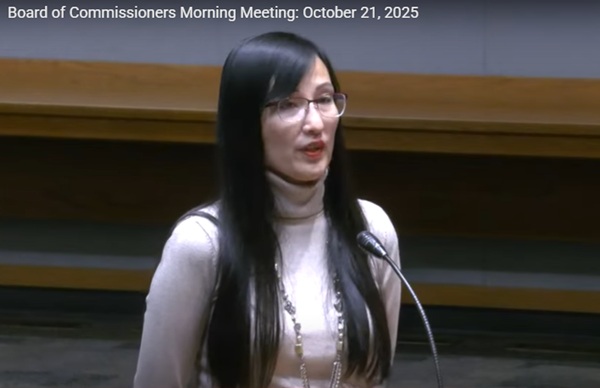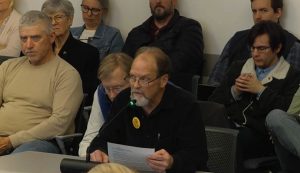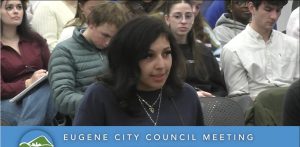Asian American community asks for support; EPD reports 22nd targeted burglary
12 min read
Presenter: Jensina Hawkins and Jenny Jonak have been speaking at public meetings and community organizations about the upcoming AAPI Public Safety Forum. Here’s Jensina Hawkins speaking to Lane County commissioners Oct. 21:
Jensina Hawkins: I wanted to draw your attention to the rash of burglaries targeting Asian homes. It’s been very heavily covered in the news that 21 Asian homes, people with Asians living in them, typically Asian business owners, have been burglarized by what appears to be a South American criminal ring.
[00:00:34] When you think about the number 21, in the city of Eugene, at least, Asians make up less than 4% of our demographic. So that 21 is a huge number. And I would challenge you to think about how many of you even know 21 agents, 21 households, could you point out where 21 Asian homes are? So that number is just absolutely enormous to us.
[00:00:58] This Thursday evening, AACO (Asian American Council of Oregon) is hosting an ‘AAPI and Allies Public Safety Forum.’ We’ll have the chiefs of police for Springfield and Eugene there, as well as District Attorney Parosa and a prosecutor from the Oregon Department of Justice Bias Crime Response. I cannot say enough about Christopher Parosa and the work that he has done to tie the law enforcement agencies together to make sure that there is a coordinated response.
[00:01:27] Due to some flexibilities or possibly failures in Oregon statute, all of the criminals that EPD arrested, all seven of them, at least six of them by now, have bailed out. Bail was set at $100,000, which means that they posted $10,000 and are free to roam around, continue their reign of terror, continue targeting Asians.
[00:01:50] I’m an Asian business owner myself. I actually own and operate a medical software consulting practice out of my home in Eugene. And so these things are very alarming for quite a few of us. So we encourage you to attend the forum on Thursday evening. It’s at 6:30 p.m. It will be at the Korean Presbyterian Church.
[00:02:08] The other thing I’m here for is to request a statement of solidarity from the Board of County Commissioners. One thing that we are severely lacking is the support from the elected officials. Individually, I believe every single one of you support us and you stand with us. We would like to see that coordinated statement to our community saying that hatred, targeting, terrorizing is not allowed for any demographic.
[00:02:31] Presenter: Later in the meeting, Lane County Commissioner Laurie Trieger:
[00:02:35] Commissioner Laurie Trieger: I know Commissioner Farr mentioned this a couple of weeks ago and Jensina Hawkins came to share with us about the AAPI safety forum, that it is 6:30 to 8 p.m. at the Korean Presbyterian Church of Eugene, which is at 1600 Taney St. And there will be child care available, and folks can learn more about that at the AsianCouncil.org website.
[00:02:58] I plan to attend and my intention was to say unequivocally that I stand with our AAPI neighbors that no one should be targeted and face this kind of fear and harm and I am looking forward to learning more at the event and perhaps bringing back a request for action at our next board meeting. And then we did have public comment asking that we make a statement.
[00:03:22] I was going to wait until after attending the forum Thursday night to hear more about the status of things and maybe make that assignment next Tuesday. But if someone else wants it to happen sooner, I would nod my head to that.
[00:03:36] Presenter: Commissioner Pat Farr:
[00:03:38] Commissioner Pat Farr: I would ask for it sooner, (County Administrator Steve) Mokrohisky, because, if we’re in agreement with that, to start looking at the wording of a statement of solidarity with the Asian community.
[00:03:47] And Ms. Hawkins suggested that we check around. Do we know 20 Asian households? Well, many of us do. You know, there are lots of Thai people living here, for instance, and the Asian community is broad. It makes up a small percentage of the total population with a high percentage of crimes against it.
[00:04:04] But there are people who are, whether they’re with the University of Oregon or other reasons to be here in Lane County and Eugene, there are lots of Asian people with Asian heritage, background who are here. And I think we can probably all name more than 20.
[00:04:18] Presenter: Speaking about the commissioners’ meeting later that day, Jensina Hawkins:
[00:04:22] Jensina Hawkins: I was actually very glad that he responded to that challenge, because nobody else did. And he mentioned that yes, we have a lot of Asian residents in the town. He was mentioning there’s a big Thai community in one of the areas. He was also mentioning that because of the university, we have a lot of people here from all different ethnicities and backgrounds for a multitude of reasons. And I was actually quite thrilled that he has that much awareness.
[00:04:50] Commissioner Trieger had stated that she wanted the statement to be made. She was willing to wait until after the forum to make sure they had more details. She did say though that if another commissioner wanted there to be an immediate statement, that she would, in quotes, nod her head for that.
[00:05:04] And Commissioner Farr did mention he wanted an immediate statement, but it wasn’t formally voted upon. And so I believe it was left to wait until after the forum.
[00:05:12] I believe that each one of them actually is very supportive and they’ve reached out offering support, assistance in any way, but I think that the power of the group, if they’re able to come together and issue a joint statement, will be much more telling for the entire community.
[00:05:29] Presenter: Jenny Jonak:
[00:05:31] Jenny Jonak: I appreciated Commissioner Trieger basically saying, just point blank on the record, that she was expressing her solidarity with the AAPI community, because public statements of support from community leaders, that’s something we really have seen very little of.
[00:05:49] Presenter: Jenny and Jensina say they are hoping people attend the public safety forum to show support for their neighbors.
[00:05:56] Jenny Jonak: Whenever you have crimes that are targeting any particular demographic, especially based on race, you want to show up and say, ‘Hey, I care. I’m concerned. I want to know how I can help,’ because that awareness really helps.
No matter how much Jensina and I talk to people, we only have our private orbits. And the more people know about this, the more awareness there is, the more that can help other people be aware, potential victims, also potential witnesses and neighbors that might be able to say, ‘Hey. That’s really weird. I noticed that person’s door is open. There’s a delivery truck driver there that I’ve never seen before. What’s going on there?’
[00:06:34] And so again, the more awareness we have, I think the better. Especially, you know, the community is worried about the impact of things like Flock cameras. So having kind of our own natural human eyes and ears out there to look out for our neighbors is really helpful.
[00:06:50] I think we’ll probably also eventually be looking at larger questions of: How do we as a community and even as a state deal with these sorts of organized crimes? I’m not sure systems were always designed or thought of that we were going to have to deal with an organized crime ring that can send in different crews.
[00:07:13] And so if we release one (crew), then what’s the impact that’s going to have? And how do we enforce those crimes? How do we prevent more of them?
[00:07:23] My larger question also is: If our prevention and detention systems are such that we’re not able to hold people that are apprehended for this, and we’re not able to have accountability, this is probably going to happen again and again and again.
[00:07:40] So it’s a somewhat helpless feeling and I think it also feeds into the underreporting that law enforcement feels is happening with these types of crimes, which is characteristic of crimes that affect Asian Americans in general. And so also trying, I think showing public sympathy will help these additional victims not feel as though they can’t come forward.
[00:08:09] Helping them feel supported is more likely to improve reporting and that will also help us get the resources we need to deal with this.
[00:08:19] Presenter: Jenny said because the criminal activity has continued, it must be making money, even after forfeiting bail.
[00:08:26] Jenny Jonak: My understanding is that it is part of an organized crime ring that does use different crews. So even, for example, if one crew were to be apprehended, there are potentially other crews that can take their place. I think that is part of what makes it also so disturbing to try to deal with.
[00:08:44] Six out of seven of them have been released and the prior suspects that were arrested in an earlier wave were also all released. So to date, we’re not actually expecting any of them to ever wind up standing trial.
[00:09:00] There are things around our bail system in Oregon that most people don’t realize. So for example, if bail is a hundred thousand, most people don’t realize that you only have to put up 10% of that. There’s no collateral or security for the rest of it.
[00:09:14] So if you have a crime like this where someone is actually, you know, an employee, a crew member of an organized crime outfit that the profit in continuing to engage in these far exceeds the $5,000 or $10,000 bail amount. The system doesn’t create any incentive for that person to come back for a hearing or to ever stand trial.
[00:09:35] And basically the law is not set up in a way to contemplate a profit motive that is then designed based on race.
[00:09:44] There’ve been a couple aspects of the law that have been puzzling to people. And one of them I think is if people are being targeted by race, why is this not some sort of hate or bias crime? I think that’s really confusing for people and it makes a big difference in terms of public perception of these, because we’re used to thinking of burglaries as crimes of opportunity and the level of, I guess emotional impact that it has on you is very different if you realize you were targeted and basically stalked because of your race.
[00:10:15] Presenter: To know that criminals have been watching your home and studying your habits represents a whole new level of invasion.
[00:10:23] Jenny Jonak: Having every corner of your home turned inside out and knowing that you were watched, that is a very, very different feeling. And I think most people really, when they hear the word burglary, they’re not thinking about that level of invasiveness. And to know also that some of these victims have been targeted more than once, I don’t think the average person realizes what it would feel like to step into the shoes of that victim and know that it could happen again to you and again, only because you are certain ethnicity. That’s really hard to imagine, hard to believe. And basically the law is not set up in a way to contemplate a profit motive that is then designed based on race.
[00:11:06] You think about the amount of discomfort that people felt with having cameras that could capture license plates. And then imagine the feeling that you would have as a victim knowing that somebody had basically put surveillance cameras and potentially watched you for weeks—like, everything you did in your home.
[00:11:22] That is such a creepy feeling. And to think that that is a habit and that your security cameras might be jammed. So a lot of the typical things that you would do and prepare for, this falls outside of that, because they aren’t crimes of opportunity. So that is a super creepy feeling, to think that that could happen at any time. Or that you might go to an Asian grocery store because you’re Asian, have someone tail you home.
[00:11:48] That is all, I think, very upsetting to people who think that they could be targeted for all of that.
[00:11:55] You have about 13% of Asian Americans in Oregon that live in poverty, and most people do not realize that the number is that high. When I say Asian Americans, you know, that makes it sound like a monolith. It’s a really wide, diverse group of people, but you do have very different financial statuses of people within this stereotyped group.
[00:12:18] And so what we see is the harm of some of these stereotypes is having people targeted, like, some of the victims that we know in these cases that are not wealthy people. They’re pretty modest people that worked really, really hard. And it had a huge impact on them, but they wouldn’t normally be targets if you profiled them for anything other than their race.
[00:12:42] Presenter: The first public safety forum had a big impact. Jensina Hawkins:
[00:12:47] Jensina Hawkins: I will say that the communication with Eugene Police Department has improved enormously since the first forum that we did in January. They’ve been extremely collaborative, and Chief Skinner has made quite a bit of his team available for me to ask questions and engage and connect with some of the burglary victims or potential victims, and it’s been really great to see how incredibly vested they are in this. And honestly, District Attorney Christopher Parosa has been simply wonderful in making sure that all of the agencies are working together and that he is informed about all of it.
[00:13:23] He’s really taken it upon himself to become a champion of this, and we appreciate him so much for that.
[00:13:32] Jenny Jonak: Yeah, he’s been fantastic, really thoughtful and knowledgeable and, I think, equally frustrated by some of the aspects that he can’t control, as we are.
[00:13:41] Presenter: What outcomes are they hoping to see from the second forum? Jensina Hawkins:
[00:13:47] Jensina Hawkins: I would love for it to put an end to all the people who don’t know that this is happening, especially those of us in the AAPI community. We want them to be informed. We want them to know that there are resources available.
[00:14:00] I would also love for it to put a stop to some of the denialism that I’ve been seeing in the public. And it’s really disappointing that in 2025 we are still combating these stereotypes that are antiquated and irrelevant and harmful.
[00:14:16] And you know, I really wish that the community would stop for a moment and think about what this area would look like if all of us Asians were so afraid that we just up and moved. It would be wonderful to have an acknowledgement of the culture and the richness that we bring to make this melting pot.
[00:14:33] And especially in Eugene, where we are so culturally diverse and we are so embracing of all the different viewpoints and opinions and perspectives. And so if these criminals succeed, there wouldn’t be a whole lot of incentives for us to stay here in town and continue contributing to a community, if we’re not supported by that community.
[00:14:54] Presenter: Jenny Jonak:
[00:14:55] Jenny Jonak: My hope is that becoming more aware of these issues and the impact and the scale of these will also motivate both our local community and hopefully communities at the state level to basically say, ‘Okay, we’re going to prioritize this. You know, this is serious. This is something that we need a task force for. This is something we need better coordination for, and this is something that we need to speak out against.’
[00:15:23] The event is this Thursday, Oct. 23. It’s from 6:30 p.m. until 8 p.m. After the event, we’ll have food and drink available. We have childcare available during the event. We also will have some language interpreters. We have a number of electeds that have committed to coming, which we really are grateful for, and our hope is to have our community there, both our Asian American Pacific Islander community, as well as the community at large, to learn more about these crimes, the impact it’s had on the community, what can be done to try to prevent more of these, and help support the community.
[00:16:05] I think hearing from people firsthand is very different than just maybe reading a few snippets on the news about it. And I think it’ll be really meaningful to the community and to the victims to have a good turnout and have people really show concern and care, especially after reading news about people getting released and potentially not being able to feel a sense of justice otherwise for those crimes.
[00:16:29] Presenter: The very same day Jensina and Jenny were speaking about the 21 burglaries, Eugene Police announced that yet another had just occurred. The Asian American Pacific Islander community looks for broad support at the public safety forum Thursday night.




